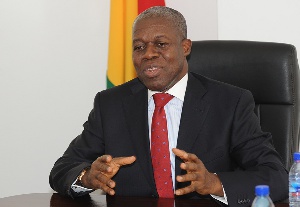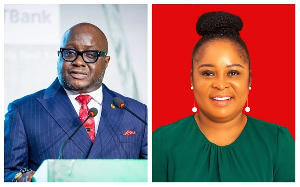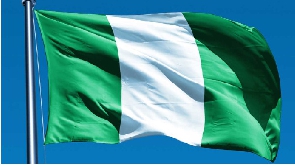The Vice President, Kwesi Amissah- Arthur says government is confident of the US$940 million Extended Credit Facility (ECF) programme approved by the board of the International Monetary Fund (IMF) to help restore economic stability.
Speaking in Accra at the launch of the Ghana Netherlands Business and Culture Council, the Vice President, Amissah- Arthur said: “We are quite confident that with the agreement that we have reached with the Fund board’s approval, we will be able to better manage our economy to achieve the growth rate that we think are necessary to ensure that poverty is reduced from our country.
“We are confident that with the support of the Fund both in terms of the analytical capacity and the little support that we are getting in terms of balance of payment we will be able to structure the economy to stabilise the economy for growth to be begin and for inflation to tamed in our country so that the country can resume the growth that we experienced a couple of years ago.”
The country, since the beginning of the 2014, the cedi depreciated against the US dollar by about 40%, pushing the country to a point where it needed the IMF’s help to stabilise the currency, boost confidence in government’s policies and accelerate the journey to restore economic stability.
Mr. Amissah- Arthur confirmed that the government and the IMF reached an agreement at the staff level for a three-year support programme. “The staff have agreed that what we have proposed to them form a consistent set of policies that will allow us to receive board approval for the programme.”
As part of the deal, government is expected to restrain growth of the public expenditures through scaling-back public sector wages and salaries, restructuring and cutting funding of state-owned enterprises and proper prioritisation of capital expenditures to safeguard social expenditures. It also include improving tax collection principally through improvement in tax compliance.
“Public expenditures through the wages and through the roles that the government has played has expanded over the years and we think that there’ the need to restrain them.
“Restrain them through a proper prioritisation of capital expenditures, the ones that can best be done through PPP arrangements are the things that we want to do.”
He added: “Poverty levels have reduced in the country but we need to do something more and we are saying that, we’ll re-prioritise our public expenditures in other to ensure that social spending is protected.
“We also need to improve tax collection principally through improvement in tax compliance so that the tax collection will be up to the standard of countries at our levels of development.”
These measures are expected to contain government borrowing and cause the budget deficit to contract to 8.5 percent of Gross Domestic Product (GDP) in 2014, 6.3 percent in 2015, and a more sustainable 4.5 percent of GDP in 2016.
Mr. Amissah –Arthur observed that the international arena has not been that favourable to the country, as world gold price went down, cocoa prices also declined at some points and now the oil is also affected by significant reductions in the prices of those products.
This development has had significant imbalances on the economy and led to major difficulties for the government in the management of the economy.
“Last May in Senchi, the situation pushed citizens to get to create a consensus for the difficult choices that have to be made to make the country grow.“But, in Senchi and following from Senchi and some of the works that we have done in developing a set of policies ourselves, we have arrived at an agreement with the staff of the IMF for this programme,” he said.
Click to view details



Business News of Monday, 9 March 2015
Source: B&FT
Amissah- Arthur confident of IMF deal
Entertainment

CEO of Caveman Watches ties the knot in private ceremony
Opinions














